Wagner: Tristan und Isolde (Belohlávek)
Introduction
A live performance of Wagner's foray into Celtic myths, filmed over two nights in August 2007.
It could be said that Glyndebourne, or at least the theatre there, was designed to be the English equivalent of Bayreuth, and John Christie, its founder, was certainly a Wagnerian at heart. It wasn't until 2003 however, that a Wagner opera was staged, and it was this very production, finally recorded four years later.
From the off, I need to say that this is one of the finest interpretations of Tristan that I have ever seen or heard. Musically, it's certainly on a par with Carlos Kleiber's CD - my other favourite, and betters it on a number of occasions, most likely due to the live performance and Belohlávek's wonderful reluctance to wallow like some long-dead German wagger.
Visual
The quality of the video is fantastic. Every nuance of the lighting is caught and the darkest scenes are still as clear as you would want.
Audio
Nothing much to say apart from the balance is superb all round and dynamic range is exemplary.
Extras
Some quite meaty fillings to the DVD make it an even more necessary acquisition.
The cast chat/documentary entitled 'Do I hear the light?' (c 55 mins) is a fairly hefty discussion by the cast et al on their roles, and how everything fits together in this production. Some pretty shots of rich people in DJs stuffing their faces and quaffing champagne in the grounds are rather unnecessary though, and perhaps serve to reinforce outdated stereotypes regarding elitism within the arts.
For some reason, Katarina Karneus is called Katherina in the titles, which doesn't detract from anything at all, but as I always like to think that I have had a hand in her success, playing in orchestras for two operas she was in before she won the title of Cardiff Singer of the World, I would think someone could get her name right.
The second main offering is a personal view by Richard Trimborn (and his cough) on the musicological and philosophical background to the opera. There are some repeated sections from the other documentary, but his enthusiasm about the music is never in doubt and this is a fascinating insight into Wagner's thought processes. His theory that the opera could just as well have been called 'Richard und Mathilde' (Wesendonk) is not new, but very persuasive, although trying to convince us, through quoting Thomas Aquinas, that only man finds a counterpart for life shows that he hasn't watched many David Attenborough programmes.
A one minute split-screen 'speed building' of the set is a pretty pointless filler.
Overall
Lehnhoff's production hovers between the traditional (at least where costumes are concerned) and the ethereal (stage design), and strikes a near-perfect balance. It is certainly far less silly than the production from the Gran Teatre del Liceu (reviewed elsewhere on this site) and allows us to concentrate on the music and drama without too many distractions. Some static movements on stage belie the intensity of the music (especially in the Act II love duet, where the protagonists don't even look at each other - very odd!), but at least we still feel involved.
And talking of the music, well you can't get much better than what we have presented here. Belohlávek obviously has no time for wallowing, as I have said, and moves the action forward to its almost unbearable conclusion, yet finds a huge amount of clarity and grace in the score on the way.
The stage performances are so much more satisfying than in Barcelona. Robert Gambill (Tristan) is an incredibly satisfying, quite lyric but dark-voiced hero, and has a huge amount of stamina. There is no contest between this performance and that of John Treleavan.
Nina Stemme (Isolde) is a powerful singer and turns her character into a force to be reckoned with - someone who is believeably annoyed to the point of murder following her abduction. Her 'Liebestod' is a fitting climax to one of the greatest filmed operatic perfomances I've seen.
Katarina (note the spelling!) Karneus (Brangäne) is a revelation. Transformed into a rather plain, but formidable retainer who is actually in love with Tristan herself, the role seems to expand with some deeply moving and quite luscious vocal work. Her's is certainly a match for Stimme's own performance.
René Pape (King Marke) is a younger variation on the usual theme, and no less welcome for it. Instead of just feeling mildly sorry for a deluded old monarch, we are actually forced to feel deep sympathy for someone who has lost his best friend.
Despite that fact that I often like peering at pit orchestras in operas on DVD, this set is a welcome break. There is no intrusive filming of the preludes, with a conductor making love to the band as best he can in those circumstances. Rather, we have almost static introductory titles to each act leaving the only wallowing to be seen on your couch.
One for the archives I think, and one which will be very hard to beat.
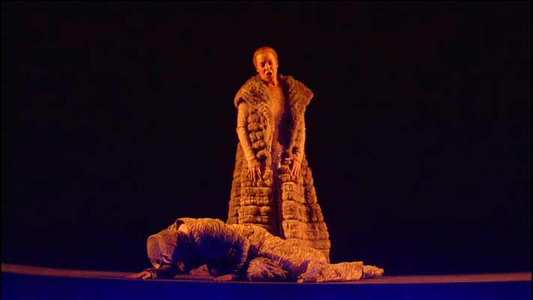
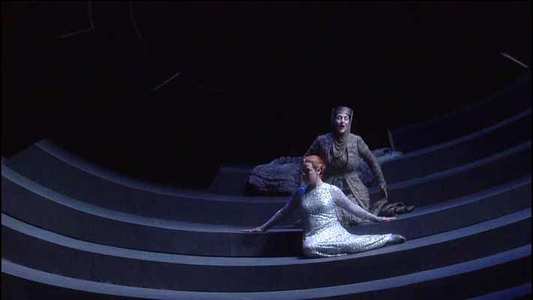
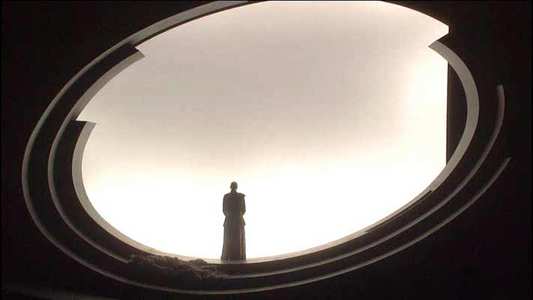
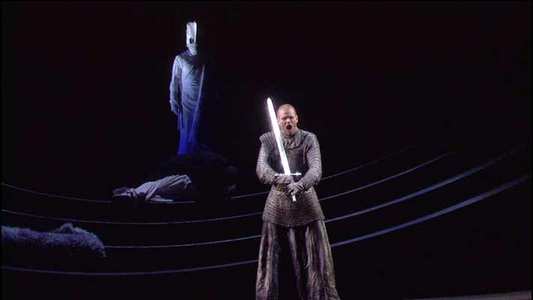
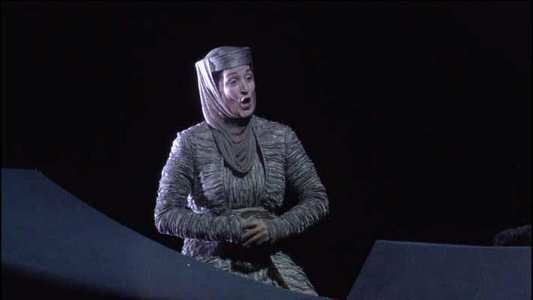
Your Opinions and Comments
Be the first to post a comment!